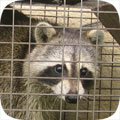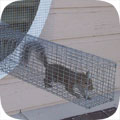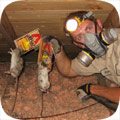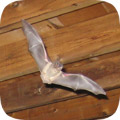- radcliff@wildlifeanimalcontrol.com
Call 24/7 for a free quote:
502-996-8856
Radcliff Wildlife Animal Control
Professional Wildlife Removal Company Servicing Radcliff, KY
If you have a problem with wildlife in your Radcliff home, your best option is to hire a company that specializes in Kentucky wildlife removal only. This is a specialty business, and regular pest control companies do not use the proper techniques to solve animal problems. I have spent many years reviewing Kentucky and Radcliff, and I recommend the following:
Pest Animal Removal Louisville
Cell Phone: 502-996-8856
NOTE: If you have a dog or cat problem, call Hardin County Animal Services: (270) 319-7055

Pest Animal Removal Louisville specializes primarily in removing animals from attics of homes and buildings - this includes squirrels in attics, raccoons, and rats or mice in homes. Kentucky also has a documented problem with
bats in buildings, and Pest Animal Removal Louisville is specially trained in bat removal. They also perform general wildlife trapping services, such as the capture and removal of skunks or opossums on the
property. Call 502-996-8856 to discuss your critter problem and schedule a same-day or next-day appointment. Click here to learn more about what prices we charge in 2023.
When hiring a company to solve your wild animal problem, you want these features:
- Specializes in wildlife removal, not pest control
- Fully Kentucky and Hardin County licensed and insured
- Works 7 days per week (critters don't take weekends off)
- Performs full building inspections: enters and inspects attic
- Performs exclusion repairs, with guarantee against animal re-entry
- Offers cleanup of biohazardous wildlife waste
Pest Animal Removal Louisville is a full-service Radcliff wildlife removal company. This is very different from a regular Radcliff pest control company. The pest control companies spray poison to kill insects. This is not at all
similar to wildlife removal. Pest Animal Removal Louisville performs a full inspection of the home or property, and determines why the animal(s) are there, and if inside a building, how the animals got inside. All
animals (including rodents) are trapped and removed, or if possible, removed from the building using special exclusion devices. Once the animals are gone, preventative repairs are essential, and
cleanup is sometimes recommended.
 Radcliff wildlife trapping - it's not as simple as it may seem. It's illegal in Kentucky to trap without a license. Trap type is very important and there are many different types, bait is somewhat relevant, trap placement
is vital, and there are dozens of small things that are very important to know.
Safety is a concern. Then once the animal is trapped, it must be removed and dealt with in the proper manner according to Kentucky law. We offer Radcliff raccoon removal. Read more about how to get rid of raccoons.
Radcliff wildlife trapping - it's not as simple as it may seem. It's illegal in Kentucky to trap without a license. Trap type is very important and there are many different types, bait is somewhat relevant, trap placement
is vital, and there are dozens of small things that are very important to know.
Safety is a concern. Then once the animal is trapped, it must be removed and dealt with in the proper manner according to Kentucky law. We offer Radcliff raccoon removal. Read more about how to get rid of raccoons.
 Animals in attics - this is our specialty at Pest Animal Removal Louisville. Many types of animals like to live in attics. This includes squirrels, raccoons, rats, mice, bats, birds, and even possums. Critters like to go into attics for a safe place to live
and raise their young. Removing animals from attics is very complex work, partly because of the presence of baby animals. If you need Radcliff squirrel removal, we can remove all the squirrels from your attic, and seal out any future ones. Read more about how to get rid of squirrels.
Animals in attics - this is our specialty at Pest Animal Removal Louisville. Many types of animals like to live in attics. This includes squirrels, raccoons, rats, mice, bats, birds, and even possums. Critters like to go into attics for a safe place to live
and raise their young. Removing animals from attics is very complex work, partly because of the presence of baby animals. If you need Radcliff squirrel removal, we can remove all the squirrels from your attic, and seal out any future ones. Read more about how to get rid of squirrels.
 Rodent control must be done in a very specific way. First off, the most important thing is that all the openings that rats and mice can use to enter a house be sealed. Then all the rodents must be physically trapped and removed.
Never, ever use poison! Most Radcliff exterminators will just use this lazy poison technique to kill rodents, and it causes more harm than good - dead stinky rats, and it doesn't solve the problem. Call us for correct Radcliff rat removal. Read more about how to get rid of rats.
Rodent control must be done in a very specific way. First off, the most important thing is that all the openings that rats and mice can use to enter a house be sealed. Then all the rodents must be physically trapped and removed.
Never, ever use poison! Most Radcliff exterminators will just use this lazy poison technique to kill rodents, and it causes more harm than good - dead stinky rats, and it doesn't solve the problem. Call us for correct Radcliff rat removal. Read more about how to get rid of rats.
 Bat removal is a highly specialized task. Kentucky is known to have colonizing bats who often live in buildings. Bats love attics. If not removed, the colony can grow to a very large size over the years. The bat droppings are often corrosive and
cause health risks. The same goes for bird droppings on or in buildings. We perform Radcliff pigeon removal and bird control. But our specialty is Radcliff bat removal. We remove 100% of the bat colony and seal the building so that it's totally bat-proof. Read more about how to get rid of bats.
Bat removal is a highly specialized task. Kentucky is known to have colonizing bats who often live in buildings. Bats love attics. If not removed, the colony can grow to a very large size over the years. The bat droppings are often corrosive and
cause health risks. The same goes for bird droppings on or in buildings. We perform Radcliff pigeon removal and bird control. But our specialty is Radcliff bat removal. We remove 100% of the bat colony and seal the building so that it's totally bat-proof. Read more about how to get rid of bats.
 If you have animals inside a house, no job is complete without proper exclusion repairs. If you simply hire a Radcliff trapper who only removes the critters, then the problem will return. You need to hire a Radcliff wildlife control company that identifies 100% of the animal entry points
into your building, and seals them shut with professional repairs. In addition, in many cases animals have left waste or contamination behind, and you'll want a company that can provide professional cleaning services. Pest Animal Removal Louisville does both.
If you have animals inside a house, no job is complete without proper exclusion repairs. If you simply hire a Radcliff trapper who only removes the critters, then the problem will return. You need to hire a Radcliff wildlife control company that identifies 100% of the animal entry points
into your building, and seals them shut with professional repairs. In addition, in many cases animals have left waste or contamination behind, and you'll want a company that can provide professional cleaning services. Pest Animal Removal Louisville does both.
The above are just some of the services offered by Pest Animal Removal Louisville. We also trap and remove animals that destroy lawns, such as moles, or digging animals. Sometimes animals like opossums will live under buildings, steal pet food, raid garbage cans, etc.
Read about how to get rid of opossums. Skunks commonly live under sheds or decks, and set up a den. We can trap and remove them without them spraying. Read about how to get rid of skunks. Pest Animal Removal Louisville
also provides dead animal removal in Radcliff. If you need help with any other wildlife conflict, from a fox, beaver, groundhog, or any other critter, we can solve it. We also do Radcliff snake removal - most of the snakes in Kentucky are not venomous, but
call us if you want safe removal, or read about how to get rid of snakes in Radcliff. And remember, we are a private business, not Hardin County Animal Control Services, so if you have a dog or cat problem, call the County at (270) 319-7055.
Hardin County animal services does not handle any wildlife issues.
Pest Animal Removal Louisville: 502-996-8856
Radcliff Pricing Info For Year 2023
 Every wildlife removal situation is different, from the species of animals involved, the location of the animal inside a house or outside, the extent of repairs or cleanup, etc. It's impossible to give one-size-fits-all prices. Examples MIGHT include:
Every wildlife removal situation is different, from the species of animals involved, the location of the animal inside a house or outside, the extent of repairs or cleanup, etc. It's impossible to give one-size-fits-all prices. Examples MIGHT include:
Small Job: For example, a one-stop job to remove an animal in the yard: $100 on up
Medium Job: For example, getting critters out of your house with minor repairs: $300 on up
Large Job: For example, a project involving many service trips and complex work: $500 on up
Give us a phone call now and tell us about your wildlife issue and we will be able to give you a price estimate over the phone. If you're cool with it, we can schedule a same-day or next-day appointment if you like. Our prices are fair, and a good value because we do the job right, the first time.
Radcliff Wildlife Tip #1:
What Is The Best Bait To Trap A Groundhog?
When you are interested in capturing groundhogs, it is important to know that selection of right bait is a crucial task, but at the same time, you need to be careful about placement of trap as well. The best idea is to set the trap in the routine runway that is between entrance point used by groundhog at your garden and the burrow it has created inside. There are so many attractive food items that you can use to capture the attention of a groundhog; it includes corn, peas, broccoli and many other vegetables.
There is no doubt to say that you can easily find lots of baits to capture groundhogs, but at the same time, there are so many traps in the market that demand careful selection to complete the job. You need to choose right size and material depending upon the size of groundhogs in your premises. Same as humans, animals also have preferences about food; one food may appear resistible to other animals, but it can be proven good to capture the groundhog. Homeowners often prefer to use delicious fruits like peaches, strawberries, and cantaloupe as baits; whereas the list of most attractive vegetables includes string beans, lettuce sweetcorn, and peas. These baits must be adjusted carefully on the trap so that animal can reach to the bait without getting any idea about the trap. Choosing right bait can make you succeed with your target and soon your garden will be free from groundhog attacks.
Some people also think of using poisonous baits to kill groundhogs in the trap, but this option doesn't appear to be good. Actually, these poisonous baits are created with attractive smells so that groundhogs can come to eat them; but it is not always necessary that these poisons cause the death of the animal, in few cases, they simply lead to serious illness and the animal suffers huge pain for several days. There is no point in giving such a terrible food to groundhogs; rather one should look for non-lethal methods to deal with the situation. Also, even if the poisonous baits cause the death of the animal, you will find it quite difficult to deal with the carcass. The animal may die at some hidden location, and soon the whole premises will be ruined by the horrible smell released from its carcass. Hence, it is better to avoid poisonous baits to deal with groundhog problem.
Another important thing you need to decide is a right trap to capture the groundhogs along with the appropriate location. Experts suggest setting the trap within 6 feet distance from burrow entry hole; however, if you find multiple burrow holes in your garden, it is better to use multiple traps to increase the chances of catching the animal. Note that groundhogs can sense human smell with ease, so it is better to wash the traps carefully to remove human scent so that groundhog can come to eat the bait fearlessly and get trapped inside.
Radcliff Wildlife Tip #2:
Kentucky Wildlife Information:
Kentucky State bird: Northern cardinal
State mammal: Gray squirrel, Thoroughbred horse
State fish: Kentucky spotted bass
State insect: Viceroy butterfly
Kentucky is a state full of rich farmland. It has a relatively flat terrain, but the state has a nice mixture of rolling hills and flat areas covered in bluegrass. The rich vegetation has been the home of some large grazing animals through the centuries, including bison. There are no wild breeding populations of bison within the state any longer, but the country's highest population of elk makes Kentucky their home. At one point in time, the state was also the native land of cougars, red wolves, and gray wolves. All three species have since been extirpated. The only top predators are now coyotes and black bears, though the black bears tend to keep to berries and insects. Some issues have been had with bears becoming too bold around garbage cans or trash sites. In situations like these, the state game commission comes in and moves the offending bear to a new location.
Coyotes are not as commonly picked up and moved, but the canines can cause some issues with farmers if natural food supplies are low. Some resident landowners have taken to introducing llamas into herds of smaller livestock. The llamas are not afraid of coyotes, and the large creatures can easily fend off an attack.
Kentucky tends to have a humid, hot summer and then a cooler, wet winter. The state can reach cold temperatures reminiscent of the Northeast, but those days are few and far between. Because the climate is so varied and the vegetation lush, Kentucky has a fair share of the common nuisance animals in the United States. Homeowners in Kentucky have to do battle with a variety of mouse species. This is due to the thick grasses which cover most of the state. Mice love to be concealed in a thick carpet of grass. Larger nuisance creatures make their home in the state as well, including bats, raccoons, snakes, beavers, otters, porcupines, opossums, squirrels, rats, armadillos, and prairie dogs.
Middle-sized animals thrive in Kentucky bluegrass. The state has a large population of rabbits, followed by a large population of foxes and bobcats. Even in areas where trees are scarce, rabbits and foxes can move through tall grass without being detected. Their burrows are protected from sight, and they are rarely seen by the public unless invading a yard.
You can always call Pest Animal Removal Louisville, any time of day, at 502-996-8856, for a price quote for Radcliff wildlife control services. I am confident that this is the best choice amongst wildlife removal companies in Radcliff, KY.





































